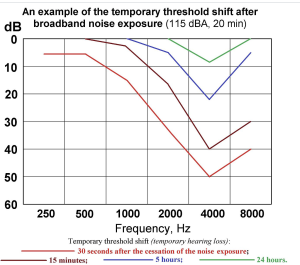Hearing Loss and Central Auditory Processing
55 Sensorineural Hearing Loss
Learning Objectives
Know the possible causes of sensorineural hearing loss and indicate the most common cause.
Understand what temporary threshold shift (TTS) is.
Understand the impact of loss of outer hair cells.
Sensorineural hearing loss is generally permanent (and, unfortunately, more common than conductive hearing loss). Sensorineural hearing loss is caused by damage to neurons (most commonly outer hair cells, but also inner hair cells and the auditory nerve) due to disease or exposure to loud noises. Frequencies in the 1000-5000Hz range are most strongly affected by environmental damage. Hearing loss is often preceded by a temporary threshold shift (TTS), which usually consists of a roughly 40dB loss after exposure to loud noise followed by a return to a normal hearing threshold within 48 hours.

Most sensorineural hearing loss is caused by the loss of outer hair cells. Damage to the stereocilia on the outer hair cells has three effects:
- Loss of the motile response blunts the frequency tuning, so sounds get mushed together.
- Loss of the amplification that outer hair cells provide at low sound levels results in an elevation of detection thresholds.
- Loudness recruitment: Sensitivity to quiet sounds is reduced, but sensitivity to loud sounds is significantly increased, meaning that sounds are only tolerable in a small range.

CC LICENSED CONTENT, SHARED PREVIOUSLY
Cheryl Olman PSY 3031 Detailed Outline
Provided by: University of Minnesota
Download for free at http://vision.psych.umn.edu/users/caolman/courses/PSY3031/
License of original source: CC Attribution 4.0
Adapted by: Andrew Bartlett

